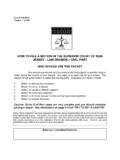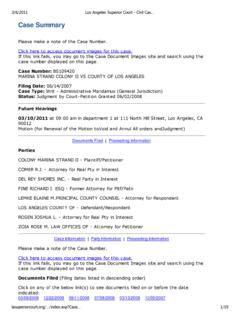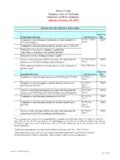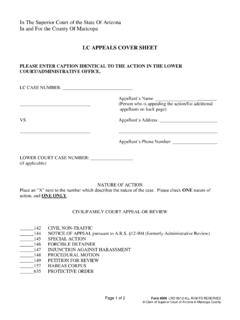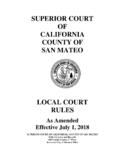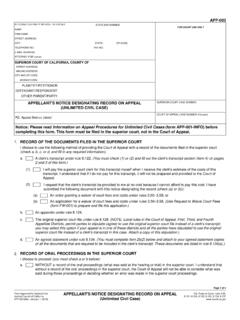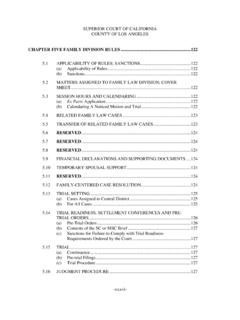Transcription of How to File a Complaint in the Superior Court of New Jersey
1 Civil - Law Complaint Updated November 17 2014. How to File a Complaint in the Superior Court of New Jersey Law Division - Civil Part Who Should Use This Packet? You can use this packet if you wish to sue another person or corporation in New Jersey for money damages for any harm or injury caused by someone to your body, property, reputation or rights. Examples of civil complaints include but are not limited to auto negligence, contract disputes, products liability, age, race, or gender discrimination and medical malpractice. If your case is valued at $15,000. or less, you may wish to use the packet for the Special Civil Part, where there are lower filing fees and shorter time periods. Note: These materials have been prepared by the New Jersey Administrative Office of the Courts for use by self-represented litigants.
2 The guides, instructions, and forms will be periodically updated as necessary to reflect current New Jersey statutes and Court rules. The most recent version of the forms will be available at the county courthouse or at However, you are ultimately responsible for the content of your Court papers. With limited exceptions, any paper filed with the Court can be looked at by the public. Completed forms are to be submitted to the county where you are filing your case. A list of Superior Court Offices is provided at the customer counter or at Revised 11/17/2014, CN 10553 page 1 of 7. Civil -Law, Complaint Things to Think About Before You Represent Yourself in Court Try to Get a Lawyer What You Should Expect If You Represent The Court system can be confusing and it is a good Yourself idea to get a lawyer if you can.
3 The law, the proofs While you have the right to represent yourself in necessary to present your case, and the procedural Court , you should not expect special treatment, help rules governing cases in the Law Division, Civil Part or attention from the Court . The following is a list of are complex. Since valuable claims or potentially some things Court staff can and cannot do for you. heavy judgments may be at stake, most litigants Please read it carefully before asking Court staff for appearing in the Law Division, Civil Part have a help. lawyer. If you are being sued, please contact your insurance company to see if they might provide a We can explain and answer questions about how lawyer for you. Most likely your opponent will be the Court works. represented by a lawyer.
4 It is recommended that you We can tell you what the requirements are to make every effort to obtain the assistance of a have your case considered by the Court . lawyer. If you cannot afford a lawyer, you may We can give you some information from your contact the legal services program in your county to case file. see if you qualify for free legal services. Their We can provide you with samples of Court forms telephone number can be found online under Legal that are available. Aid or Legal Services.. We can provide you with guidance on how to If you do not qualify for free legal services and need fill out forms. help in locating an attorney, you can contact the bar We can usually answer questions about Court association in your county. Most county bar deadlines.
5 Associations have a Lawyer Referral Service. The County Bar Lawyer Referral Service can supply you We cannot give you legal advice. Only your with the names of attorneys in your area willing to lawyer can give you legal advice. handle your particular type of case and will sometimes consult with you at a reduced fee. There We cannot tell you whether or not you should bring your case to Court . are also organizations of minority lawyers throughout New Jersey , as well as organizations of We cannot give you an opinion about what will lawyers who handle specialized types of cases. Ask happen if you bring your case to Court . your county Court staff for a list of lawyer referral We cannot recommend a lawyer, but we can services that include these organizations.
6 Provide you with the telephone number of a local lawyer referral service. If you decide to proceed without an attorney, these materials explain the procedures that must be We cannot talk to the judge for you about what followed to have your papers properly filed and will happen in your case. considered by the Court . These materials do not We cannot let you talk to the judge outside of provide information on the law governing your Court . claims or defenses; information on how to conduct pretrial discovery; information on alternative dispute We cannot change an order issued by a judge. resolution procedures, such as arbitration or Keep Copies of All Papers mediation, that may be available or required in your Make and keep copies of all completed forms and case; information on the kinds of evidence you need documents related to your case.
7 To prove your claims or defense at trial; or information on other procedural and evidentiary rules governing civil law suits. Revised 11/17/2014, CN 10553 page 2 of 7. Civil -Law, Complaint Overview A civil suit begins with the filing of a Complaint and civil case information statement (CIS) with the appropriate filing fee. Within 10 days of the filing of the Complaint , the plaintiff will receive a Track Assignment Notice (TAN). A case is assigned to one of four tracks depending on the type of case and the length of time it should take to complete discovery. The Complaint , CIS and TAN must be served with the summons on all parties. Defendant must file an answer to the Complaint along with the appropriate filing fee within 35 days after service of the Complaint .
8 After the Complaint is served and an answer is filed, the discovery period begins. The time for discovery depends on what track the case is assigned to. During the discovery period, the parties exchange information about the case. At any time during the case, a party may make a motion to the Court for some specific relief. Prior to a trial, cases may be sent to mediation (a meeting in which a neutral third party facilitates discussion between the parties to reach a resolution of their differences) and/or arbitration (a hearing in which parties present their positions to a neutral third party who makes a recommendation for resolving the case which may be accepted or rejected by the parties). If mediation and/or arbitration is unsuccessful, a case will be scheduled for trial.
9 The trial may take place before the judge alone or before a judge and a jury. At the trial, both sides present evidence supporting their positions. The decision of the judge and/or jury is contained in the final judgment. If a party wishes to appeal the final decision, a notice of appeal must be filed in the Appellate Division within 45 days after the entry of the final judgment. Definitions of Words Used in This Packet Affidavit of Merit - The Court Rules require that a plaintiff in a medical or professional malpractice case file an Affidavit of Merit by a neutral expert asserting that the defendant's performance was below the standards of the profession. Caption - A caption is the name of the case; it lists the name of the plaintiff(s) and the defendant(s).
10 For example, John Jones, Plaintiff v. Mary Smith, Defendant. Certification - A certification is statement that certain facts are true to the best of the knowledge of the person making the statement. It is like an affidavit, but is not sworn before a notary or other authorized person. Certification of No Other Actions - A certification of no other actions is a sworn written statement at the end of the Complaint in which you state that, to the best of your knowledge, the action about which you are complaining is not the subject of any other Court matter or arbitration, that there are no other parties that need to be added to this action and that you recognize the obligation to notify all parties and the Court if there are any changes. Civil Action - A Civil Action is a noncriminal case in which one individual or business sues another individual or business.


